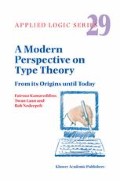Access this chapter
Tax calculation will be finalised at checkout
Purchases are for personal use only
Preview
Unable to display preview. Download preview PDF.
References
cf. Principia, *1.01, p. 94
cf. Principia, *3.01, p. 107
cf. Principia, *4·01, p. 117
cf. Principia, *10·01, p. 140
see Remark 2.12 [footnote of the authors].
This definition is based on Frege’s definition in Grundlagen der Arithmetik [50] (1884). See [145], vol. II, p. 4. In [50], the natural number n is defined as the class of predicates f for which there are exactly n objects a for which f(a) holds. Hence 0 is the class of predicates f for which f(u) does not hold for any object a So 0 can be described by the pf ∀x231D;z(x)]
See Definition 2.2 for the notion of elementary proposition. In the Principia, an elementary pf is a pf that has elementary propositions as values, when it takes suitable arguments.
The term elementary functions refers to a pf that has only elementary propositions as value, when it takes suitable (well-typed) arguments. See Principia, p. 92.
As for individuals: see Principia, *9, p. 132, where ‘Individual’ is presented as a primitive idea. As for elementary judgements: See Principia, Introduction, pp. 43–45.
In the Principia, Whitehead and Russell write ϕ!x instead of ϕx to indicate that ϕx is not only (what we would call) a pf, but even a legal pf.
Rights and permissions
Copyright information
© 2005 Springer Science + Business Media, Inc.
About this chapter
Cite this chapter
(2005). Type theory in Principia Mathematica. In: A Modern Perspective on Type Theory. Applied Logic Series, vol 29. Springer, Dordrecht. https://doi.org/10.1007/1-4020-2335-9_3
Download citation
DOI: https://doi.org/10.1007/1-4020-2335-9_3
Publisher Name: Springer, Dordrecht
Print ISBN: 978-1-4020-2334-7
Online ISBN: 978-1-4020-2335-4
eBook Packages: Mathematics and StatisticsMathematics and Statistics (R0)

